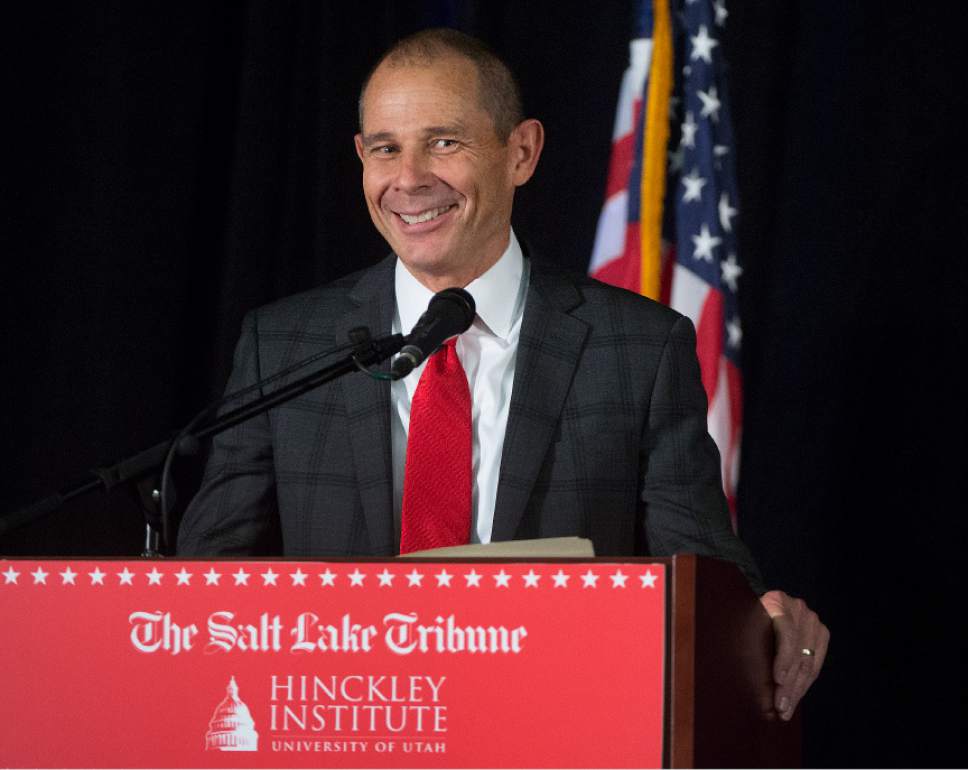This is an archived article that was published on sltrib.com in 2017, and information in the article may be outdated. It is provided only for personal research purposes and may not be reprinted.
People who live in Utah's 3rd District would be forgiven if they are a little tired of congressional politics.
Their last representative, Jason Chaffetz, up and quit a month ago after seven years of being a media hound of the first order but accomplishing very little. He remains a fixture on Fox News — now handsomely paid for his opinions — while his constituents have been left with an expensive by-election, a barrage of bad campaign advertising and a quick decision to make.
An important step in that process is the Republican primary, staged, like the rest of it, in a hurry and without much opportunity for public input or scrutiny. The official date of the primary election is Aug. 15, though mail ballots have already arrived in voters' homes and early voting begins Tuesday.
In a district where the GOP is so strong, the winner of the Republican primary has a huge head-start toward the Nov. 7 general election, where the nominee will face Democrat Kathie Allen and a handful of minor party and unaffiliated hopefuls.
Of the three candidates who will be on the Republican ballot, one clearly separates himself, not only in terms of taking on the job of representing the district, but also in restoring a sense of seriousness and maturity to the job.
That candidate is Provo Mayor John Curtis.
Curtis is finishing his second term as mayor of what is widely seen as one of the most successful and best-governed cities in the state. He has earned a reputation as a level-headed and inclusive leader who was able to control budgets and keep spending under control in a way that was thoughtful rather than vindictive.
His platform promises a search for reasonable, worked-out solutions to such seemingly intractable problems as immigration, health care and public lands. As a congressman, Curtis would give his constituents every reason to hope for a process that takes all views into account and resists the temptation to score partisan points.
Curtis criticizes his own party for letting seven years go by without coming up with a viable fix or replacement for the Affordable Care Act, one that would stress portability and transparency. He also sees that the federal government has been mucking about in health care for decades and that just standing aside and allowing the current system to go bust is not reasonable.
He holds out hope that the controversy over the new Bears Ears National Monument could find a congressional solution, one that would honor the needs of all those who care about the area and give the different groups, including the Native Americans who pushed for the designation, some real say in how it will be managed.
He seeks a humane solution to the nation's immigration controversy, making it easier for skilled workers to come here legally and offering those already here without documentation a chance "to get right with the law."
Like any good Republican, Curtis promises to work toward a smaller federal government, reduced regulatory burdens on business and a simpler, fairer tax code.
The other names on the Republican primary ballot are those of businessman Tanner Ainge and former state Rep. Chris Herrod. Neither matches what Curtis would bring to the job.
Herrod represents the far-right of the party, raising groundless alarms about "socialized medicine" and making ominous noises about deporting undocumented workers and continuing to fight the federal government for control of lands that are quite clearly the possession of all the American people.
Ainge is the newbie in the race, and some of his simplistic ideas about privatizing health care and gutting the Antiquities Act are less than fully developed. But he is bright and his business experience has been largely focused on helping the private sector deal with federal regulations, taxes and other places where the public and private sectors intersect. Even if he is eliminated in this primary, it is likely that Utah voters will not have seen the last of him.
This year, though, Republicans who vote in Utah's 3rd Congressional District would be well advised to choose John Curtis as their standard-bearer. He might not be as flashy as some. But he will be too busy trying to work out real solutions to real problems to embarrass his constituents.



